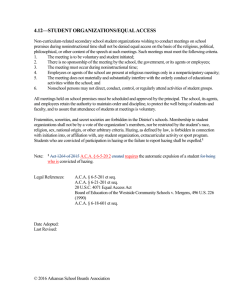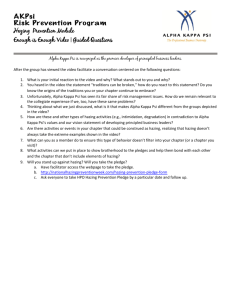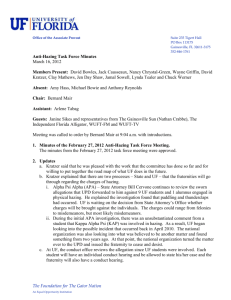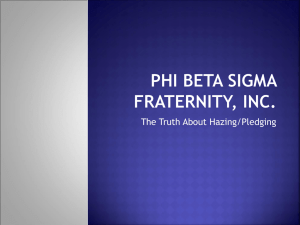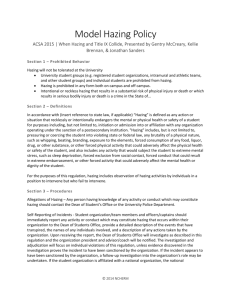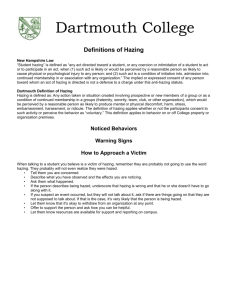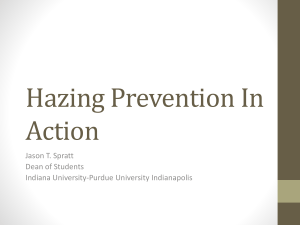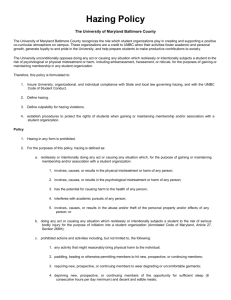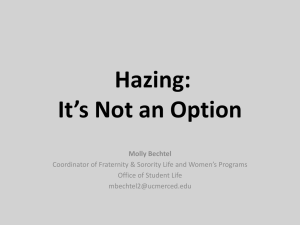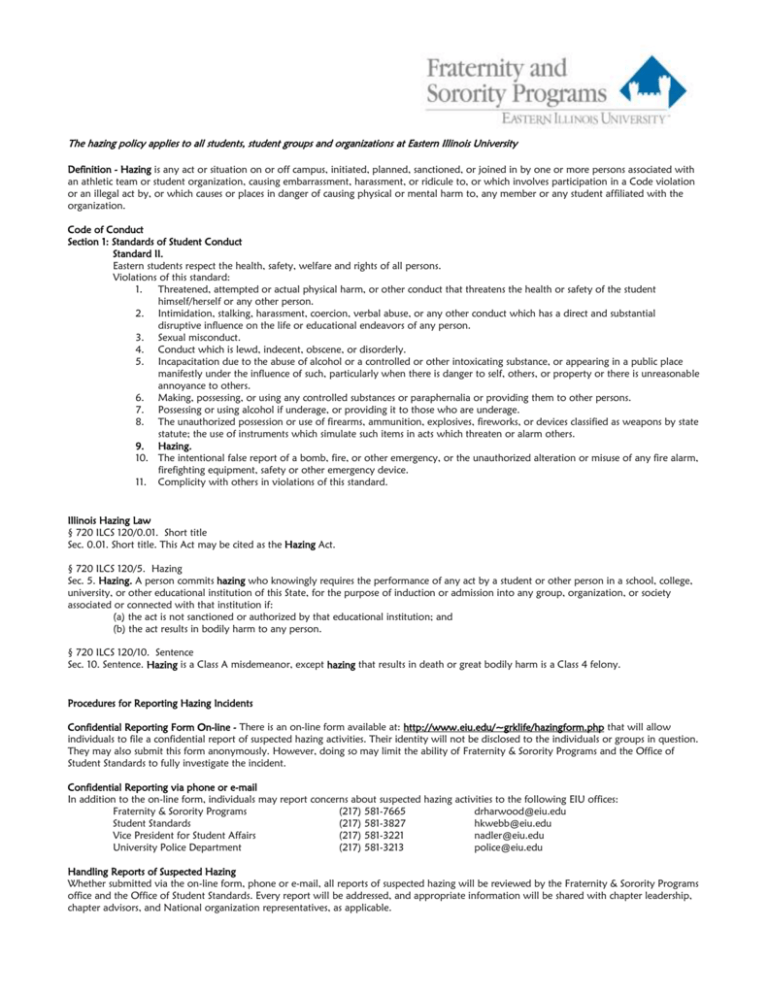
The hazing policy applies to all students, student groups and organizations at Eastern Illinois University
Definition - Hazing is any act or situation on or off campus, initiated, planned, sanctioned, or joined in by one or more persons associated with
an athletic team or student organization, causing embarrassment, harassment, or ridicule to, or which involves participation in a Code violation
or an illegal act by, or which causes or places in danger of causing physical or mental harm to, any member or any student affiliated with the
organization.
Code of Conduct
Section 1: Standards of Student Conduct
Standard II.
Eastern students respect the health, safety, welfare and rights of all persons.
Violations of this standard:
1.
Threatened, attempted or actual physical harm, or other conduct that threatens the health or safety of the student
himself/herself or any other person.
2. Intimidation, stalking, harassment, coercion, verbal abuse, or any other conduct which has a direct and substantial
disruptive influence on the life or educational endeavors of any person.
3. Sexual misconduct.
4. Conduct which is lewd, indecent, obscene, or disorderly.
5. Incapacitation due to the abuse of alcohol or a controlled or other intoxicating substance, or appearing in a public place
manifestly under the influence of such, particularly when there is danger to self, others, or property or there is unreasonable
annoyance to others.
6. Making, possessing, or using any controlled substances or paraphernalia or providing them to other persons.
7. Possessing or using alcohol if underage, or providing it to those who are underage.
8. The unauthorized possession or use of firearms, ammunition, explosives, fireworks, or devices classified as weapons by state
statute; the use of instruments which simulate such items in acts which threaten or alarm others.
9. Hazing.
10. The intentional false report of a bomb, fire, or other emergency, or the unauthorized alteration or misuse of any fire alarm,
firefighting equipment, safety or other emergency device.
11. Complicity with others in violations of this standard.
Illinois Hazing Law
§ 720 ILCS 120/0.01. Short title
Sec. 0.01. Short title. This Act may be cited as the Hazing Act.
§ 720 ILCS 120/5. Hazing
Sec. 5. Hazing. A person commits hazing who knowingly requires the performance of any act by a student or other person in a school, college,
university, or other educational institution of this State, for the purpose of induction or admission into any group, organization, or society
associated or connected with that institution if:
(a) the act is not sanctioned or authorized by that educational institution; and
(b) the act results in bodily harm to any person.
§ 720 ILCS 120/10. Sentence
Sec. 10. Sentence. Hazing is a Class A misdemeanor, except hazing that results in death or great bodily harm is a Class 4 felony.
Procedures for Reporting Hazing Incidents
Confidential Reporting Form On-line - There is an on-line form available at: http://www.eiu.edu/~grklife/hazingform.php that will allow
individuals to file a confidential report of suspected hazing activities. Their identity will not be disclosed to the individuals or groups in question.
They may also submit this form anonymously. However, doing so may limit the ability of Fraternity & Sorority Programs and the Office of
Student Standards to fully investigate the incident.
Confidential Reporting via phone or e-mail
In addition to the on-line form, individuals may report concerns about suspected hazing activities to the following EIU offices:
Fraternity & Sorority Programs
(217) 581-7665
drharwood@eiu.edu
Student Standards
(217) 581-3827
hkwebb@eiu.edu
Vice President for Student Affairs
(217) 581-3221
nadler@eiu.edu
University Police Department
(217) 581-3213
police@eiu.edu
Handling Reports of Suspected Hazing
Whether submitted via the on-line form, phone or e-mail, all reports of suspected hazing will be reviewed by the Fraternity & Sorority Programs
office and the Office of Student Standards. Every report will be addressed, and appropriate information will be shared with chapter leadership,
chapter advisors, and National organization representatives, as applicable.

